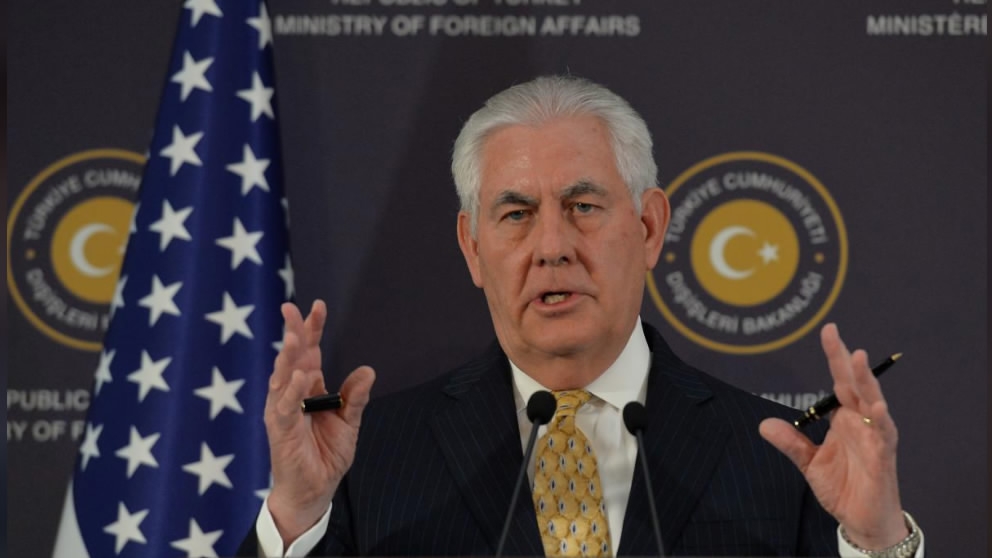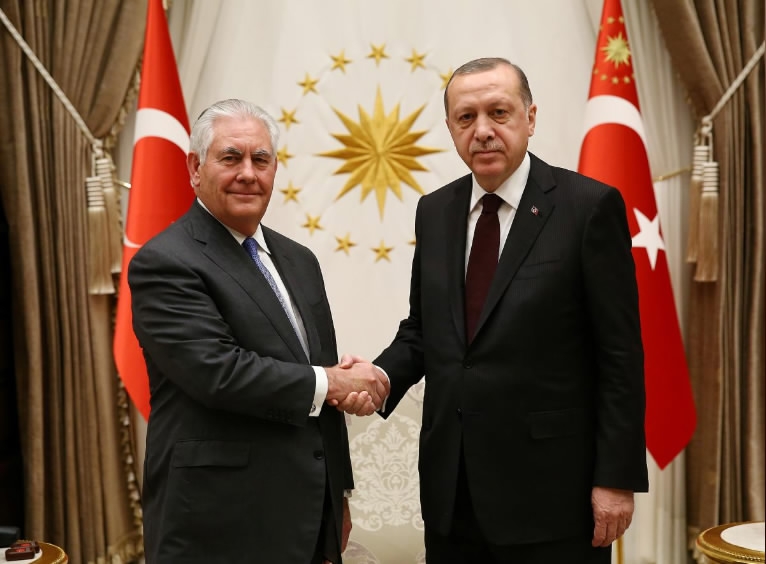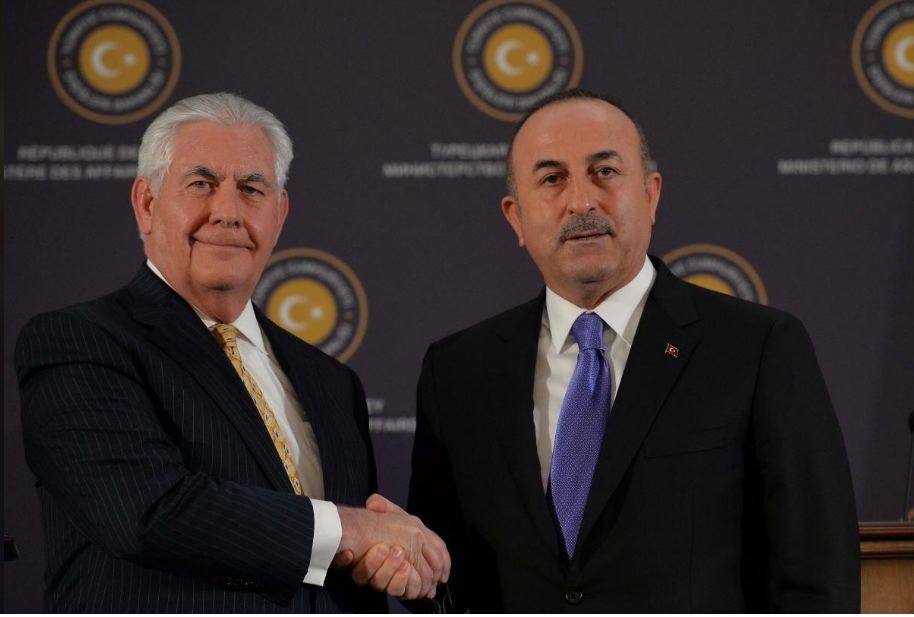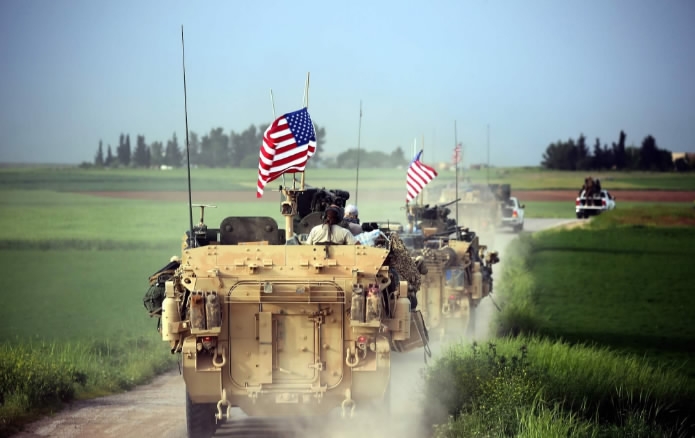
Politics
20:37, 17-Feb-2018
Tillerson’s Turkey visit a success or not?
By Michal Bardavid

There were a lot of expectations on US Secretary of State Rex Tillerson’s Turkey visit that took place Feb. 15 to 16 in the capital Ankara.
Tension that was built up before his arrival was almost tangible. An anti-American rhetoric was expressed by both government officials and the public in general. Turkish President Recep Tayyip Erdogan went as far as threatening to teach American troops what an Ottoman slap would feel like, and Turkish Foreign Minister Mevlut Cavusoglu had declared this visit would either make or break relations.
These statements aimed to make it clear how sensitive the situation was from Turkey’s perspective.

Turkish President Tayyip Erdogan meets US Secretary of State Rex Tillerson in Ankara, Turkey, February 15, 2018. /Reuters Photo
Turkish President Tayyip Erdogan meets US Secretary of State Rex Tillerson in Ankara, Turkey, February 15, 2018. /Reuters Photo
There are several issues that have created this build up – the main one being caused by a potential confrontation between US troops and Turkish forces in Syria’s Manbij City.
There are about 2,000 US troops stationed in Manbij. They are there to support, equip and train the Syrian Kurdish group-People’s Protection Units known as the YPG, which played a key role in the fight against ISIL as an ally of the US in Syria.
However, for Turkey, this same group is considered a terrorist organization, as Ankara believes it still has ties with the Kurdistan Worker’s Party PKK – deemed a terrorist organization not only by Turkey but also by the US and EU.
The YPG is basically at war with Turkey at the moment, as Ankara launched a major offensive labeled “Olive Branch” with the aim of clearing border areas of the Kurdish militants in Afrin Syria. Turkey believes the presence of the YPG along the Turkish-Syrian border is a national security threat. Turkey is against the formation of an autonomous Kurdish region being formed along the border.
Erdogan has repeatedly stated once the Afrin operation is completed, Turkish troops and the Syrian rebels supporting them on the ground would move forward into Manbij and continue its fight against the YPG there. And that is where the danger lies for Turkish-US relations.

US Secretary of State Rex Tillerson shakes hands with Turkish Foreign Minister Mevlut Cavusoglu after a news conference in Anakara, Turkey, February 16, 2018. /Reuters Photo
US Secretary of State Rex Tillerson shakes hands with Turkish Foreign Minister Mevlut Cavusoglu after a news conference in Anakara, Turkey, February 16, 2018. /Reuters Photo
But even before the Afrin operation began, the US arming of the YPG had already been a major issue for Turkey. During Tillerson’s visit, Cavusoglu stated that the US had made promises regarding the YPG even before the Trump administration took office.
Cavusoglu was referring to Washington’s promise that they would ensure the YPG would withdraw to the east of the Euphrates River. Cavusoglu stated that the Obama administration had vowed this would happen – yet did not follow through on their promise. Though Tillerson acknowledged Turkey’s "legitimate security concerns" – Cavusoglu stressed Ankara expected more than words.

April 28, 2017: US forces, accompanied by Kurdish People's Protection Units (YPG) fighters, drive their armored vehicles near the northern Syrian village of Darbasiyah, on the border with Turkey. /VCG Photo
April 28, 2017: US forces, accompanied by Kurdish People's Protection Units (YPG) fighters, drive their armored vehicles near the northern Syrian village of Darbasiyah, on the border with Turkey. /VCG Photo
Before his departure, Tillerson and Cavusoglu held a press conference and declared the two NATO allies were indeed on the path to mend ties. They also took the opportunity to emphasize there were other issues of conflict as well; Tillerson expressed Washington’s concerns regarding the detentions of US employees in Turkey and called for the release of American pastor Andrew Brunson. While Cavusoglu reiterated Turkey’s request for the extradition of Muslim cleric Fethullah Gulen in self-exile in the US, who Ankara believes is behind the failed coup of 2016.
But when it comes to the future of Turkish-US ties, Cavusoglu announced they had decided to establish mechanisms to normalize relations between the two allies, one of the mechanisms being the creation of joint working groups. The first of these meetings is expected to take place no later than mid-March.
Tillerson stated the issue of Manbij would be prioritized. This, it seems, has eased some of the tension; however, the two leaders revealed few specifics on their plan as to how they propose to solve their differences. Nevertheless, the willingness and intention to do so was clearly expressed and bought both sides some time.
It will be critical to see what kind of steps the two allies take especially in Syria in the days leading up to their planned “working group” meeting in March.

SITEMAP
Copyright © 2018 CGTN. Beijing ICP prepared NO.16065310-3
Copyright © 2018 CGTN. Beijing ICP prepared NO.16065310-3